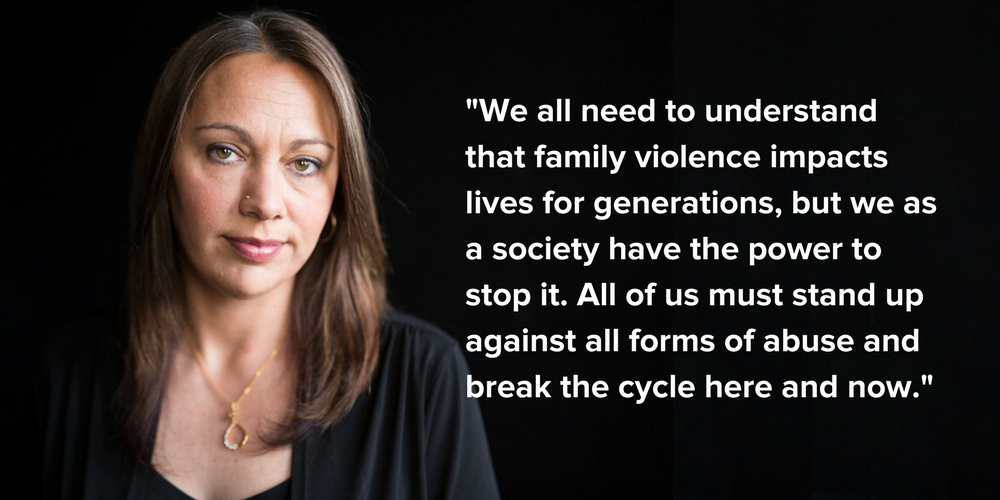Renay’s Story

I grew up in an environment that led me to believe anger was a normal response to anything. If something went wrong, someone was to blame and that person should “cop it”.
My mum struggled with mental health issues and when things were particularly bad for her she would take it out on me and my siblings. I would get beaten for simply putting too much milk in my cereal.
I recognised the physical abuse as wrong and resented her for it, but as a child, I didn’t understand that her screaming and breaking things were also abuse. I thought yelling and threats were just part of life.
So when I grew up and got a boyfriend who was emotionally and psychologically abusive I had no idea that our relationship wasn’t “normal”.
When I think back on it, it seems obvious that his behaviour was manipulative and controlling – he would stone wall me, hid my belongings, isolated me, orchestrate arguments and use childish tactics to get his way.
He would also blame me for everything – all the problems in our relationship were “my fault”, a result of my shortcomings.
For ten years I truly believed this. I whole-heartedly thought that the relationship was flawed because I was flawed. I stayed, not realising just what I was experiencing.
Never did it occur to me that I was being abused – after all, it’s not like he was hitting me.
Even now, I have a hard time identifying as someone who experienced family violence because I don’t feel “abused enough” because the violence in my intimate partner relationship was only occasionally physical.
Sometimes I feel like I have no right to stand up and speak out because I have no visible scars left behind by the family violence I endured, therefore it can be hard to see what damage was done to me.
When I left…
Since leaving my ex I have come to realise that the abuses that he committed against me on a daily basis were very real and deserve attention. Emotional and psychological abuse is not something anyone should have to go through and yet I am far from alone in having had experiences like this – one in three women will experience a non-physical form of family violence in their lifetime.
I am still living with the impacts of abuse. I battle anxiety attacks, anger issues, social phobia and other cognitive disorders which hamper my ability to live life properly, the way that I would like to live it.
Issues that were seeded as a child and left me vulnerable to abuse as an adult still affect me every day.
I am particularly aware of how I am as a parent. Sometimes I feel compelled to react to my children’s misbehaviours by yelling or getting overly angry (mirroring some of my mother’s and ex’s reactions) but I am also conscious of this and work hard to behave better than they did. I don’t want to pass on my learned behaviours to my kids.
I believe that all forms of violence create an environment that breeds further violence and steps need to be taken to prevent the inter-generational cycle of family violence from perpetuating any further.
This is a key reason I chose to become an advocate and share my story – to raise awareness and be part of the effort to ensure that, for our children’s children, family violence is a thing of the past.
As an Advocate…
Becoming a Survivor Advocate has helped me to rise above fear, doubt and mental health issues and recover from my experiences. It has been so rewarding getting to meet so many other survivors who are all such inspirational, courageous women.
But it has also showed me how far reaching family violence is and how much this issue still needs to be highlighted – ignorance and denial surrounding the existence and reach of emotional abuse is alive and well. We must educate adults to understand what constitutes violence and raise our children to know who they are with a strong sense of self awareness.
To anyone reading this who is experiencing abuse…
I would say, you have the right to be safe and take whatever measures you need to for that to happen. There is help available – and not just help that will support you to get away from the violence, but also organisations and programs to help you recover from what you’ve gone through and move on into a complete and full life.
You’re stronger than you know and you can choose how your story ends.
To the broader community…
We all need to understand that family violence impacts lives for generations, but we as a society have the power to stop it. All of us must stand up against all forms of abuse and break the cycle here and now.
—
As part of the 16 Days of Activism Against Gender-Based Violence, safe steps is sharing the stories of several safe steps Survivor Advocates. The Survivor Advocate Program is an ongoing initiative that that empowers women with a lived experience of family violence to publicly share their stories.
safe steps recognises that survivors have been among the most powerful activists for change regarding societal attitudes towards family violence. By courageously sharing their stories, survivors have raised community awareness about abuse in the home, and pushed for important political and sector reforms.
We share the stories of some of our safe steps Survivor Advocates to ensure their powerful experiences are heard by even more people, and honour the important contribution each woman has made as an advocate and an activist.
